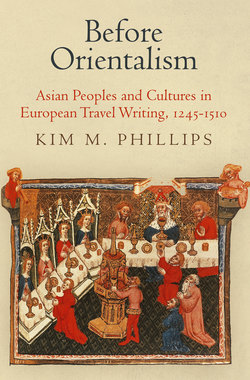Читать книгу Before Orientalism - Kim M. Phillips - Страница 8
На сайте Литреса книга снята с продажи.
ОглавлениеNote on the Text
All English-speaking authors in this field find themselves compromised by the problem of spelling proper nouns. As a broad guide, I generally follow the forms employed in John Block Friedman and Kristen Mossler Figg, eds., with Scott D. Westrem, associate editor, and Gregory G. Guzman, collaborating editor, Trade, Travel, and Exploration in the Middle Ages: An Encyclopedia (New York: Garland, 2000). Chinese places and names are given in Pinyin without tone marks. Where there is potential for confusion, especially with regard to place-names, the medieval author’s spelling is included as well as a currently accepted form. No doubt some readers will be dissatisfied with the results, but I hope that all will be able to recognize the people and locations mentioned or find them in a reference work or map.
When using abbreviated forms of medieval European authors’ names I include only the most distinctive part of the name (usually Anglicized). Christian names are generally preferred over bynames, but not surnames, except where the Christian name is too common to avert confusion: thus: Carpini rather than John, Rubruck rather than William, but Ricold and Jordan rather than Monte Croce and Catala. When an author is infrequently referred to or no part of his name is memorable, the whole is preferred (for example, Benedict the Pole, Andrew of Perugia).
In the text, quotes are generally given in English translation. The translations have been compared with the original text in the edition named in the endnotes and modified in some instances. To save space, the original Latin, French, Franco-Italian, or other wording is only briefly quoted, whether in the text or endnotes, when likely to be of special interest. References to the main primary texts in the endnotes are generally given by medieval author and now commonly used title, with book and chapter numbers or other subdivisions where available, followed in parenthesis to page references to the edition of the original language used and (in most cases) to an English translation. Where I have modified a translation or provided my own, this is made clear.
